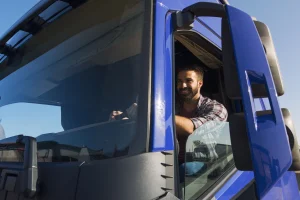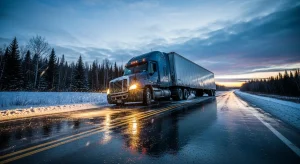From CB radio to GPS, a nostalgic look at the evolution of trucking.
It is said that the golden age of trucks took place in the 1970s, a period when truck drivers were portrayed as rebels, laying the foundations for the industry we know today. During the 1980s and 1990s, modernity began to gradually make its way in, with technological advances that once seemed impossible. By the 2000s, truck power increased, and new regulations began to be implemented.
Many truck drivers who started their journeys in these decades today look back nostalgically on the “good old days,“ when everything seemed better. On this trip down memory lane, let’s review 6 things that retro truckers used to do that are now completely different.

1. CB Radios and “Breaker, Breaker” Communication
Truck drivers relied heavily on CB radios to communicate with each other, sharing road conditions, speed traps, or just chatting. The iconic “breaker, breaker” or “10-4” was part of trucker culture.
Today, most truckers use smartphones and apps to stay informed, making CB radios less common. However, CB radios are still in use, just less frequently.
2. Manual Logbooks
In the golden age, truck drivers had to manually keep logbooks to track their Hours of Service (HOS). It was a laborious process done with pen and paper. Now, with the introduction of Electronic Logging Devices (ELDs), this process has become automatic and digital. Although many truckers still prefer the manual process.

3. Memorizing Routes and Paper Maps
What did truckers do before GPS? In the old days, truckers had to rely on their memory and paper maps to find their routes. Long-haul drivers often knew highways, truck stops, and specific landmarks by heart.
Today, GPS systems and route software have revolutionized navigation, making paper maps almost obsolete. However, truckers are still experts at memorizing routes, especially when it comes to trips they take regularly.
4. Manual Shifting and Gearboxes
A few decades ago, most trucks were manual, requiring drivers to be skilled at shifting gears while driving. Some even used double-clutching techniques to make proper gear changes. In contrast, many modern trucks are automated, making driving easier, especially for new drivers. This is why an old-time trucker might say that today’s truckers have an “easier” job.

5. In-Person Dispatch of Goods
In the old days, goods dispatch was often done by phone or in person at the loading docks. Drivers had to regularly contact shippers to confirm pickup and delivery details. Today, this process is done digitally, with all the necessary information obtained through smartphone apps or company-specific software.
6. Safety Measures
Finally, safety measures in the golden age weren’t as elaborate as they are now. Trucks had limited safety features, such as basic brakes, with no stability control or advanced safety systems. Nowadays, trucks come with multiple safety features, such as lane assist, automatic emergency braking, and adaptive cruise control.

The trucking industry has come a long way, and while technological advances have made many processes easier, that doesn’t mean the present is necessarily worse. However, remembering how things were done in the past always offers a nice trip down nostalgia lane, especially for truckers who lived through those times. So, are you more drawn to modernity, or would you prefer to stick to the old days?

What Truck Drivers Love Most About Their Job
Truck driving isn’t just a job; for many, it’s a calling that offers a unique blend of freedom, adventure, and independence. By Bob Dilliplaine, Industry

Frozen Roads After Bomb Cyclone: Black Ice, Record Snow and High Risk for Trucks
Frozen roads continue to disrupt freight transportation following the impact of a powerful bomb cyclone, leaving behind black ice, highway shutdowns, power outages, and dangerous winter driving conditions stretching from the Gulf Coast to New England.

Lunar New Year 2026: Ancient Traditions, Renewed Energy, and Massive Celebrations
Lunar New Year 2026 begins on February 17 under the sign of the Fire Horse and is marked by spiritual rituals, family reunions, and large-scale celebrations in both China and the United States, especially in California.

Freedom 250 Grand Prix: How Logistics and Transportation Will Power the Race in Washington
The first-ever IndyCar street race in Washington, D.C., scheduled for August 21–23, will headline the United States’ 250th anniversary celebrations — and it will trigger a massive transportation, freight, and urban logistics operation behind the scenes.

Groundhog Day: What It Means for Trucking When “Phil Sees His Shadow”
The forecast from America’s most famous groundhog is calling for more winter — and that’s an important signal for the trucking industry and cold-season route planning

Love on the open road: the best dating apps for truckers
If you’re looking for someone to go the long haul with, here are the best dating apps for truck drivers. They say love is everywhere…
